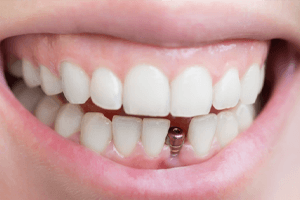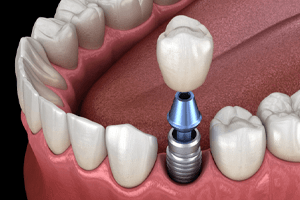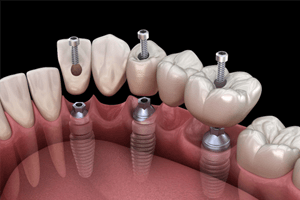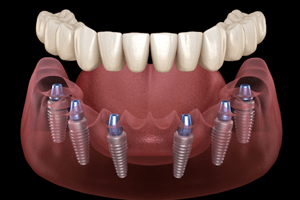Dental Implants – Oakton, WA
Rebuild a Beautiful, Functional Smile
Traditional tooth replacement methods restore only those parts visible when patients smile. Although effective, without the underlying root structure, patients may still experience adverse oral health effects related to tooth loss, including diminished jawbone density and gum tissue volume. Dental implants in Oakton restore the entire tooth, both the roots and the crown. If you have lost one or more teeth, contact Oakton Dentistry by Design to schedule your consultation for dental implants today.
Why Choose Oakton Dentistry by Design for Dental Implants?
- In-House Dental Implant Placement & Restoration
- Dentists with Years of Extensive Experience
- We Offer Additional Financing Through CareCredit
What are Dental Implants?

Dental implants are small titanium posts that can be surgically placed below the gumline, within the jawbone. Due to their biocompatibility, they’re able to naturally fuse with the bone through a process called osseointegration, allowing them to function just like your natural tooth roots once did. Once the fusion is complete, our team can then attach free-standing restorations to the implants, which will function as an unwavering foundation for them.
The 4-Step Dental Implant Process

Unlike traditional tooth replacement solutions such as dentures and dental bridges, placing dental implants involves a special multi-step process that takes several months to complete. While this may seem like a while to wait, implants deliver significant long-term benefits that make them worth the effort. At Oakton Dentistry by Design, we provide in-house dental implant services so we don’t have to refer you to an outside specialist. Our dentists are quite experienced in placing dental implants, allowing them to develop individualized and effective treatment plans for each patient. While each dental implant placement surgery is unique, they all involve the following steps: consultation, surgery, osseointegration, and attaching the final restoration.
Initial Dental Implant Consultation

To help determine whether dental implants are right for you, one of our skilled dentists in Oakton will conduct a thorough evaluation of your teeth and gums. We’ll ask about your oral and medical health history as well, and we may have to perform preliminary procedures such as gum disease therapy, bone grafting, or tooth extractions to prepare you for implants. Based on our findings, our team will create a customized treatment plan for you and walk you through it so you know exactly what you can expect to pay and experience throughout the process.
Dental Implant Surgery

Once you consent to our proposed treatment plan, our team will schedule your dental implant placement procedure. We perform the surgery in-house, so you’ll be able to be treated by the same team you trust throughout the entire process and avoid any need for referrals. To surgically place your implants, we will begin by using a local anesthetic to render the process painless before making incisions in the gums and placing the implant posts in the jawbone. We’ll then close the surgical wounds and place a protective cap over the posts to prevent injuries and infections.
Dental Implant Osseointegration & Abutment

After your dental implants have been placed, it will take between three and six months for them to fully integrate with your jawbone through the natural process of osseointegration. This gives the implant a sturdy foundation that allows it to function just like a real tooth. Once your gums and jawbone have healed, we will attach small metal connector pieces called abutments to the tops of the implants with a minor surgical procedure. During the following few weeks, you’ll have time to heal while your final restorations are crafted from impressions taken of your teeth.
Delivery of Dental Implant Restorations

The final step of your treatment will be when our team secures your permanent restorations to your dental implants and makes any final adjustments so you can wear them comfortably. Your restorations may take the form of a dental crown that can replace a single tooth or a fixed denture that can replace many or all of your teeth. In any case, once this step is completed, you’ll be ready to enjoy life with your newly completed smile.
Benefits of Dental Implants

Replacing both the root and crown of the tooth allows you to enjoy various advantages that are not possible with conventional treatments, including:
- Over a 95% 10-year success rate
- Looks and feels natural
- Restores 70% of your biting force
- Preserves your jawbone’s density
- Stops dental drift
- Improves oral health
- Protects your facial structures
- Long-term affordable solution
Are Dental Implants Right for You?

Every dental implant treatment that we do is custom-tailored to our individual patient’s needs. Chances are, if you’re missing one or more teeth, you’re likely a good candidate for the treatment, but the best way to find out is to schedule a consultation with our team. During this visit, we’ll walk you through all of your treatment options, and if dental implants are right for you, we’ll provide important details about our plan of action, like how many implants you’ll need to have placed. Below, you can get a better idea of what your journey will look like depending on your unique situation.
What We Look for in Good Candidates:

Generally, you are a candidate for dental implants if you have good oral and general health, but you still need a consultation with your implant dentist in Oakton to ensure they are right for you. You also need a CT scan to assess the health of your jawbone. Your medical and lifestyle history are also discussed to ensure there are minimal risks for implant failure. Based on the results of the consultation, you may need additional treatments before your placement surgery, like bone grafting or a sinus lift.
Missing a Single Tooth

After a tooth is lost, your jawbone deteriorates because it is no longer stimulated by the root. This makes your remaining natural teeth lose support, so they drift toward the open space. This increases your risk of tooth decay, gum disease, and bite issues, causing you to lose more teeth over time. Dental implants are the only treatment that can stimulate your jaw to stop bone loss and the complications associated with it.
Traditional prosthetics only replace the visible portion of a tooth. Dental implants go a step further to also treat the root. A titanium implant post is inserted into your jawbone to act as a new root to preserve its density.
Replacing both the root and the crown allows you to enjoy various advantages not possible with conventional treatments, including:
- Over a 95% success rate
- All-ceramic crown makes it look natural
- Restore as much as 70% of your biting force
- Preserves your jawbone’s density to stop dental drift
- Decreases your risk of tooth decay, gum disease, and additional tooth loss
- Does not alter healthy teeth
- Supports your facial structures
- Long-term, cost-effective treatment
Missing Multiple Teeth

Bridges have been a reliable choice for dentists for many years when a patient needs to replace one or more teeth in a row. A traditional bridge is comprised of replacement teeth are fused to two dental crowns. These crowns are affixed to healthy teeth on both sides of the gap in your smile in order to hold the bridge in place.
An implant bridge works similarly except that the dental crowns are attached to dental implants instead of two healthy teeth. The implants are positioned in the jaw alongside the gap in your smile. Then, the crowns are attached to the implants and your smile is once again complete.
Some of the benefits of replacing multiple teeth with dental implants include:
- Nearby teeth are not affected by dental implants
- Implants act like tooth roots, so they are more comfortable and secure
- Implanted posts stimulate healthy new bone tissue growth that preserves the shape and strength of your jawbone
- Implant-retained restorations are not removed for cleaning
- With proper oral hygiene and regular dental checkups, dental implants can last 30 years or more, and sometimes for a lifetime
Missing All Teeth

If you’re missing an entire row of teeth, our team can rebuild your arch by securing anywhere from four to eight dental implants along the gumline. These will act as a stable support system for a full denture to be attached to, completely eliminating any slipping or shifting that typically occurs with traditional dentures.
Understanding the Cost of Dental Implants

Dental implants cost more upfront than traditional tooth replacement treatments, but they can last a lifetime with excellent care, meaning you won’t ever need to worry about replacing them. The cost of a dental implant at Oakton Dentistry by Design is determined by factors such as the need for additional procedures and how many teeth you are replacing. In some cases, you can use your dental insurance to help lower the cost of the treatment. We’ll be happy to go over the specifics of the cost of your treatment at your consultation.
Preliminary Treatments & Dental Implant Surgery

Some patients need preliminary treatments such as gum disease therapy, bone grafts, or tooth extractions before receiving dental implants, and these procedures will be included in the final bill. However, your insurance may pay for these treatments at least in part.
Dental implant surgery will incur its own cost based on factors such as where the implants are being placed and the anesthesia used. Since we place dental implants in our office, we can offer you the convenience that comes with not worrying about seeing an outside oral surgeon who uses a different pricing structure.
The Parts of Your Dental Implant

The parts of your dental implant incur their own costs. Factors that influence the final bill include:
- The type of restoration being placed: Your implant may be used to mount a dental crown, a bridge, or a denture. The smaller the restoration is, the less expensive it will be.
- Size of the implant: Dental implants may be longer or shorter based on where they are placed in the jaw, and larger appliances are more expensive.
- Implant brand: Implants are manufactured by a number of companies that use different pricing structures.
- How many implants are placed: Each dental implant placed in the jaw will be noted individually on the bill.
Please contact our staff if you have any questions regarding how our dental implants are made.
Are Dental Implants Worth the Investment?

Dental implants require a large investment of time and money, but they offer significant benefits. Some of the many advantages that make implants worth the effort include:
- An implant-supported restoration offers a 95% or higher success rate after twenty years and 80-85% success after 30 years. Traditional bridges, partials, and full dentures must be replaced every five to ten years for proper function.
- Implant dentures function just like your natural teeth would, leaving you free to consume a varied, nutritious diet.
- Implant posts act as your tooth roots, restoring the exercise your jawbones need to stay healthy.
Does My Dental Insurance Cover Dental Implants?

In most cases, dental insurance will not offer coverage for the dental implant posts or their surgical placement. However, other aspects of the treatment such as the replacement teeth and preparatory procedures may receive some insurance coverage. Our team knows how to maximize your available benefits to offset the out-of-pocket costs of your implants and help you fit the treatment into your budget.
Making Dental Implants Affordable

Since we understand that paying for a dental implant all at once may be difficult for some patients, we offer third-party financing plans through CareCredit to help keep your new smile affordable. Please don’t hesitate to talk to our team for assistance with navigating your dental insurance and financing options.
Dental Implant FAQs
Will I need a bone graft if I want dental implants?
Bone grafting and dental implants often go hand-in-hand; however, the additional procedure isn’t always necessary. The long-term success of dental implants starts with the right foundation, which is why it’s important to have a strong, healthy jawbone. We’ll review a CT scan to evaluate your jawbone’s density. If we have any concerns about your jaw’s ability to support the posts, we’ll recommend bone grafting. Although it will add another step to your treatment plan, it’s essential for the viability of your new smile.
Can I get dental implants if I have gum disease?
Although it is preventable, gum disease is the leading cause of tooth loss. If you’ve lost a tooth or two from the infection, you aren’t a candidate for dental implants if your gum disease is active. Don’t worry, you can become a candidate with periodontal therapy. We’ll create the personalized plan you need to stop the infection.
Does getting dental implants hurt?
It’s normal to be concerned about pain because you will need oral surgery to place the post into your jawbone. We use sedation or anesthesia to ensure your comfort, so you won’t feel any pain. You will have some tenderness and swelling for a few days while you recover, but you can manage it with over-the-counter pain relievers and cold compresses.
Once you’ve healed, you should never experience any pain. If discomfort occurs, it can be a sign of dental implant failure. Don’t wait to contact our office. We will detect the cause of your pain to protect your investment.
Can dental implants fail?
Dental implants are the most reliable tooth replacement treatment. The risk of implant failure is rare. In fact, it’s generally less than 5%. You can ensure your new smile thrives by committing to your oral hygiene. Brush your teeth at least twice a day and floss every night before going to bed. Pay extra attention when cleaning the abutments and posts. Besides caring for your smile at home, don’t forget to visit your dentist at least twice a year for a cleaning and checkup.
Can I use dental insurance to help pay for dental implants?
Many insurance carriers will cover a portion of the treatment after paying your annual deductible. This can lower the cost of certain steps in your plan until you reach your yearly limit. We will work on your behalf with your insurance carrier to file the necessary claims and forms to minimize your out-of-pocket expenses. We’ll help you find the solutions you need to keep your new smile affordable.